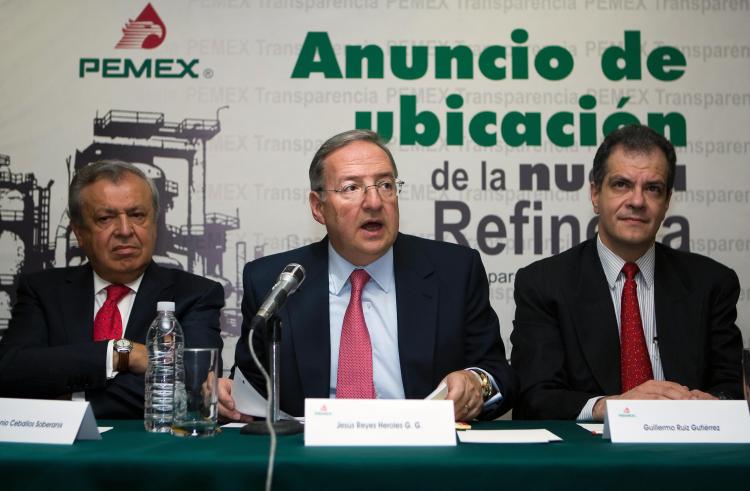Mexico, the manufacturing hotbed of U.S. companies, faces strong hurdles toward achieving its economic potential, a new report by the World Economic Forum (WEF) has found.
Mexico has more weaknesses than strengths when it comes to trade competitiveness and business innovation, according to the Mexico Competitiveness Report 2009, released last week by the WEF.
The WEF noted that Mexico is especially dependent on state-owned petroleum company Petroleos Mexicanos (PEMEX) for governmental revenues.
But PEMEX’s oil wells may run low in the foreseeable future. With the government dependent upon PEMEX as a cash cow, a funding shortfall could manifest in the near future if the government does not invest in other sources of income, according to a recent Knowledge @ Wharton (KW) study. KW is the publishing arm of the Wharton School of Business at the University of Pennsylvania.
In addition, Mexico’s main trading partner by far is the United States, and any economic downturn here results in severe repercussions in Mexico. During the first quarter of 2009, Mexico exported products worth $52 billion to the U.S. and imported $38 billion of goods from the U.S., contributing $14 billion to the U.S. trade deficit.
Mexico’s world trade was $72 billion during the same period with a little over 72 percent of it consisting of exports to the United States, according to Organization for Economic Co-Operation and Development (OECD) statistics.
“Mexico’s economy continues to appear particularly vulnerable to external downturns, given its close association with the U.S. business cycle and the heavy dependence on oil revenues to fund the public sector,” the WEF report said. “The marked slowdown of the U.S. economy sparked by the subprime mortgage crisis is already having an important impact on Mexico’s growth.”
Impediments to growth and development
Equally challenging is Mexico’s ineffective and politicized government that stifles competition, experts say. A high level of corruption also exists in both private and public sectors, in addition to a lack of transparency by financial, business, and government entities that choke innovation. Further impediments include an underdeveloped infrastructure with immature transportation and erratic electrical systems.
What hampers Mexico’s business sector even more is discouraging labor regulations, which force companies to pay expensive layoff and benefit expenses. As such, there is a large informal labor market in Mexico where employees receive no benefits, low wages, and work under terrible working conditions. Estimates suggest that approximately 60 percent of Mexico’s workers are employed in an informal market.
“Countries cannot continue to grow if they simply rely on efficient markets and production processes; they must start to compete by producing new, unique value-added goods … the capacity to generate endogenous technology and to use sophisticated production processes becomes critical,” the Mexico Competitiveness Report said.
Potential despite flaws
Despite Mexico’s large market size and close proximity to two of the world’s highly developed and technologically advanced nations—the United States and Canada—it still ranks only 60th among 134 nations with a score of 4.23 on the Global Competitiveness Index (GCI), according to the WEF.
The report claims that analysis of Mexico’s competitive and innovative strengths and weaknesses “reveals a series of important flaws. These problems must be tackled if the country is to fulfill its competitive potential.”
Yet, there is a ray of hope for the government, as the reports points out. Mexico’s business sector is fairly well-developed. It is one of the largest cement producers and has a well-developed agricultural sector, which allows it to sell its agricultural products in international markets.
“Mexico is a country of great potential, with a unique geographical position, a young population, and a rapidly expanding market,” the WEF said. “This potential must and can be fulfilled by a joint effort of all political parties, the business sector, and civil society to address the deficiencies … Only then can the country take advantage of its diverse competitive advantages and ensure sustained growth and enduring prosperity for its citizens.”
Mexico’s financial markets
“Despite liberalization of the Mexican banking sector over the past decade, banking service penetration remains low. Mexico’s stock market—the Bolsa Mexicana de Valores—remains an exchange for only the largest companies,” KW suggested in one of its recent articles on the Mexican economy and markets.
Around 70 percent of Mexico’s populace is employed in more than 200,000 small and medium-sized businesses. But these businesses lack access to the capital markets, thus restricting their growth. They have to rely on funds from family, relatives, friends, and their own savings. Venture capital is also hard to come by, limiting the ability of start-up companies to thrive and develop.
The Mexican government recently passed a securities market law that allows “businesses to issue securities without the registration and regulation requirements typically associated with public offerings as long as they restrict the sale of their shares to a limited number of qualified investors.”
The above law gave rise to Negocios Extrabursátiles, an over-the-counter market designed to spur venture capital funding, which was founded by the Mexican business establishment.
The market is in its infancy and many difficulties still have to be ironed out, such as transparency issues with small privately owned firms, educating business owners and investors concerning the release of financial information, and archaic tax laws that favor investment in large businesses.
“Negocios Extrabursátiles has been working hard to generate interest among private investors and venture capital funds. To date, 218 companies are listed, but fewer than 10 transactions have closed,” a KW article said.







Friends Read Free